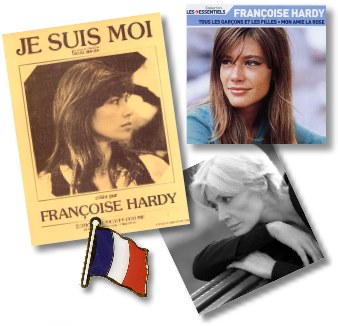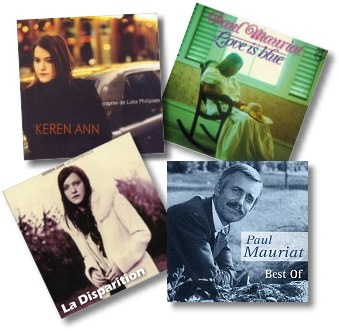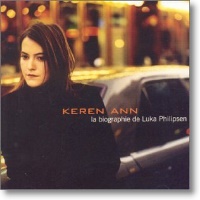| EYEFUL TOWER: Musings | |||||||||||
|
|||||||||||
 May 19,
2006 May 19,
2006As many of you know, I decided to learn the French language after seeing almost 80 French films. I rely on self-compiled and self-generated materials, taking full advantage of my tech apparatuses, programming skills & prior research in linguistics. As part of the benefits of being my own teacher, I get to choose my own homework assignments! No boring readings or essays writing for me! A friend suggested listening to French songs as a way to learn, and as you will see, it's an excellent idea. If you have related experiences to share, please contact me. I'm actually gathering materials for a multi-year project. My exposure to French music up until now For years, two of my favorite French songs are:
Les feuilles mortes (Autumn Leaves), and
L'oiseau et l'enfant
For my American readers: Eurovision is big in European pop culture, and has influence on the music scenes of the world. That's how ABBA and Celine Dion originally launched their careers. It started exactly 50 years ago, in 1956, long before I was even born. Incidentally, the event's system and format has just been licensed to some American entertainment conglomerate earlier this year. They're going to start an American version here soon. I also like a few songs by Jane Birkin (and Serge Gainsbourg), such as their famous hit song Je t'aime moi non plus. And, of course there is La Marseillaise. In fact, I have quite a collection of it, including marching band, symphonic orchestra, operatic solo, and chorus versions, plus various instrumental renditions. I have always liked marches in general, and national anthems in particular, ever since my high school days. I also have a small collection of Paul Mauriat albums and CDs. Years ago, Winnie, my former, former "sister-in-law-to-be" from Hong Kong, who married a Frenchman and had been living in Paris, introduced us to a bunch of French chansons and the cafe music. Some of them were very nice, but at the time, with my other pre-occupations, I never did get around to remember the names of the pieces, and the groups.
My new discovery As I explored the French music scene, I found the style of
Françoise Hardy very appealing. So is Jacno, in his mellowed incarnations. Then, by chance, I came across a sound
clip of what appears to be a live interview (hear
it
At the request of the host, she gave an impromptu performance of a passage from a well-known chanson Ballade Irlandaise, by Bourvil, a French actor and singer. I've never heard of it before. I found the melodic characteristics, as well as the familiar structure of simple stanzas and refrain particularly striking, as they resemble the style of the few songs that I have written between 24 and 30 years ago. The refreshing voice of Keren Ann with her simple acoustic guitar accompaniment are remarkably well-suited for the piece, and I was instantly mesmerized. In fact, I was impressed enough that I looked into her biography and musical works. Within 2 days, I ordered her 2000 debut CD entitled La Biographie de Luka Philipsen. I'm now planning to get her 2002 follow-on CD: La disparition. Music as language study tool It appears that there is a small but fairly significant group of Americans who enjoy French songs, without actually understanding a word of what it says. I now recall a similar phenomenon back when I was in Hong Kong. Only it's the Hong Kong people who are fond of British, Australian and American songs, without always fully understanding the lyrics. I was one of them until around age 14, when I started actually paying attention to the words. When one doesn't understand the lyrics, the relationship formed with the song is very different, from that of a native speaker audience. Essentially, the unintelligible vocal sound is perceived as yet another instrument, with distinct tonal signature and feel, but no explicit set meanings. When one finally understands it, by way of interpretation, or learning the language, the imagery is altered. In most (but not all) cases, the enjoyment and connection are enhanced. The universalness of music communicates directly to the core of the soul, and transcends cultural and linguistic boundaries. It enables us to judge music on a purely subjective and emotional basis, independent of the tangible factors. Having said that, I must point out that the curiosity and motivation are clearly present, to understand the lyrics in the foreign-language songs we have grown to love. As such, music presents itself as a great vehicle in which to learn the language. Another major advantage: the musical framework serves as a memory aid, for recalling proper pronunciations and grammatical details. Fact: Melodically rendered sentences get imprinted in the mind quicker and deeper. And, that's a good thing for learning! Lyrics Translation Exercise
My next "assignment" was to attempt a formal translation of the entire CD. That turns out to be quite a challenge, as one can imagine, especially for me―a complete beginner in French. Naturally, I miss out on all the subtle things that I have yet to learn. I did find it relatively easy to look up words and translate phrases to get the rough general meanings. However, being bilingual (English & Chinese), I already fully realized and appreciated the fact that things simply don't translate, due to the lack of 1-to-1 mapping across languages and cultures. There's also the constant dilemma of doing a literal translation,
vs. an adapted version to better preserve/emulate the original style
and feel, and account for the cultural and perspective differences. With poetic lyrics that are heavy in symbolism
Here is my lyrics translation of:
See also: |
|||||||||||
|
|||||||||||
|
|
|||||||||||
|
|
|||||||||||
 Finally, in the "classical" arena, Claude Debussy, Frédéric
François Chopin had been among my favorites. Other French
composers I like include: Hector Berlioz and Maurice Ravel. I did minor in
music, back in my under-grad college days, and these were all well-studied.
Finally, in the "classical" arena, Claude Debussy, Frédéric
François Chopin had been among my favorites. Other French
composers I like include: Hector Berlioz and Maurice Ravel. I did minor in
music, back in my under-grad college days, and these were all well-studied.